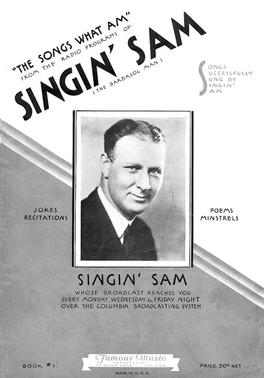Singin' Sam

Singin' Sam aka Harry Frankel (January 27, 1888, Springfield, Ohio -June 12, 1948, Richmond, Indiana) was a minstrel performer, vaudevillian[1] and popular personality during the early days of radio. He was best known as "Singin' Sam, the Barbasol Man" for his long association with that company.
Early life
The son of clothing merchant Sol Frankel, Harry grew up in Danville, Kentucky, singing in various quartets, moving with his parents to Richmond, Indiana, when he was nine years old. He joined Coburn's Minstrels in 1908 and later toured with Al G. Field's Minstrels. Frankel and Joe Dunlevy were known as the "Two Blackbirds" when they performed in vaudeville theaters during the late 1920s.[2]
Career
When Frankel began in radio in 1930 on WLW (Cincinnati, Ohio), sponsored by the Great States Lawn Mower Company, he started using Singin' Sam as his professional name, and he was also known at that time as "The Lawnmower Man."[3] In New York he began as "Singin' Sam the Barbasol Man" on WABC on July 20, 1931.[4] He disliked New York, and three years later, he returned to Richmond, Indiana, with vocalist Helene "Smiles" Davis,[a] so named because of her identification with the (then new) song "Smiles" while singing to the troops during World War I. The couple married May 2, 1934, in Richmond and lived first on their 5-acre (20,000 m2) farm, known as Just-a-Mere Farm, ll miles west of town on the National Road (now U.S. Route 40). They later lived on small farm on the southeast side of Richmond with a large colonial revival house with a pool and several outbuildings. In late 1934, Singin' Sam returned to broadcasting after Barbasol arranged to do his show live from Cincinnati, an easy commute.
He continued with Barbasol until 1941, and during that time, he also did shows for Coca-Cola, flying to New York on alternate weeks to make transcriptions for his weekly 15-minute Refreshment Time with Singin' Sam, which aired from 1937 to 1942.[5] In total, he made 260 transcriptions for the syndicated program.[1]
He retired about a year before his death.[6]
He died in hospital[6] in Richmond of a heart attack in 1948.[5]
Others
Harry Frankel should not be confused with country singer Singin' Sam Agins (1919–1996) and others who adopted the name.[7]
Notes and references
Notes
- ^ Helen "Smiles" Davis (né Helen Sylvia Davis; 1890–1981) had earlier been married, from 1908 to 1916, to Ned Wayburn (1874–1972), with whom she had a son, Edward Claudius Wayburn, Jr. (1909–2010).
References
- ^ a b DeLong, Thomas A. (1996). Radio Stars: An Illustrated Biographical Dictionary of 953 Performers, 1920 through 1960. McFarland & Company, Inc. ISBN 978-0-7864-2834-2. P. 98.
- ^ "Harry Frankel". The Final Curtain. The Billboard. June 26, 1948. p. 45. Retrieved April 28, 2016 – via Google Books.
- ^ Edwards, Brenda S. (January 18, 2015). "Popular singer had Danville roots". The Advocate-Messenger. Retrieved April 28, 2016.
- ^ Taylor, Timothy D. (2012). "Chapter 3: The Great Depression and the Rise of the Radio Jingle". The Sounds of Capitalism: Advertising, Music, and the Conquest of Culture. University of Chicago Press. p. 75. ISBN 978-0-226-79115-9. Retrieved April 27, 2016 – via Google Books.
- ^ a b Morrisson-Reeves Library, Richmond, Indiana, Local History Collection
- ^ a b Associated Press, "'Singin' Sam' Dies From Heart Attack", San Bernardino Daily Sun, San Bernardino, California, Tuesday 15 June 1948, Volume LIV, Number 248, page 3.
- ^ Singin' Sam Agins Archived 2007-09-28 at the Wayback Machine
External links
- 1888 births
- 1948 deaths
- American radio personalities
- Musicians from Richmond, Indiana
- People from Danville, Kentucky
- Musicians from Springfield, Ohio
- American male film actors
- American male voice actors
- Gennett Records artists
- Burials at Earlham Cemetery, Richmond, Indiana
- 20th-century American male actors
- Male actors from Ohio
- Male actors from Kentucky
- Male actors from Indiana
- Singers from Ohio
- Singers from Kentucky
- Radio personalities from Ohio
- Radio personalities from Indiana
- Radio personalities from Kentucky
- 20th-century American singers
- 20th-century American male singers
